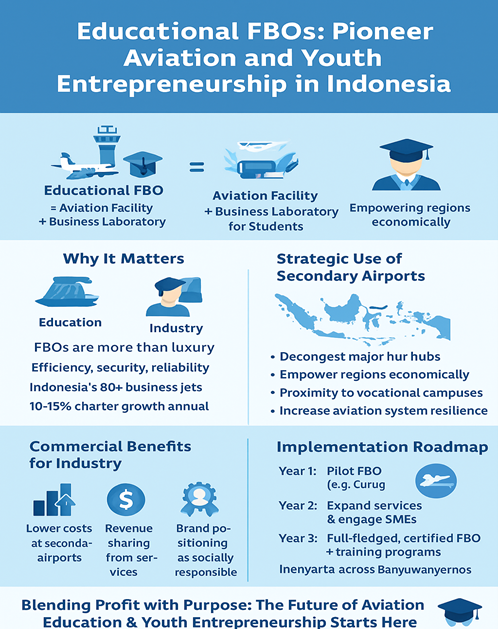Introduction
In the coming decade, civil aviation in Southeast Asia is expected to undergo a major transformation, not only in terms of passenger traffic growth but also in the emergence of new service models that blur the lines between education, industry, and community. Indonesia, with its vast archipelago and increasingly dynamic aviation sector, has a unique opportunity to lead such a transformation through what I call the Educational Fixed Base Operator (FBO) model.
Unlike conventional FBOs, which primarily focus on providing premium ground handling and passenger services for business jets, the Educational FBO integrates a dual function: serving as a fully operational aviation service facility while simultaneously becoming a business laboratory for vocational aviation students. It is, in essence, a hybrid model of commercial service, academic incubation, and social responsibility.
This concept, if nurtured properly, could reposition Indonesia not only as a regional hub for business aviation but also as a global pioneer in aviation education and youth entrepreneurship.
FBOs: More Than Just Lounges for the Wealthy
For decades, FBOs have been seen as exclusive domains for the privileged few—corporate leaders, high-ranking officials, celebrities, and the ultra-wealthy. Their services range from VIP lounges, ramp handling, fueling coordination, to bespoke catering. In Southeast Asia, such facilities remain concentrated in major hubs such as Soekarno-Hatta, Halim Perdanakusuma, Bali, and Medan.
However, this exclusivity hides an overlooked fact: FBOs are not only about luxury; they are also about efficiency, security, and reliability. For operators of business jets, especially in corporate and medical evacuation missions, having access to efficient FBOs can mean saving crucial time and ensuring mission success.
Indonesia, with more than 80 registered business jets and a steady annual growth of 10–15 percent in the charter sector, is already a significant market for FBO services. Yet, the services remain centralized, expensive, and disconnected from the educational ecosystem. This is where the Educational FBO enters the picture.

The Missing Link in Aviation Education
A recurring challenge in Indonesia’s vocational education—especially in aviation—is the gap between classroom learning and real-world business exposure. While vocational institutions have excelled in producing technically competent graduates, they often fall short in nurturing entrepreneurial mindsets.
Graduates know how to operate ground support equipment, design safety procedures, and follow ICAO standards, but they rarely experience what it means to run an aviation business: pricing a service, negotiating with clients, balancing operational costs, and dealing with unpredictable market dynamics.
An Educational FBO fills this missing link. By situating vocational students directly in the operation of a real FBO—under supervision, of course—they are exposed to both technical and managerial realities. They do not merely simulate service; they serve actual clients, manage actual facilities, and calculate actual revenue and costs.
This experience transforms students from mere job seekers into potential job creators, planting the seeds of aviation entrepreneurship at an early stage.
Industry-Academia Partnerships: Beyond CSR Tokenism
For such a model to work, industry must play an active role. Traditionally, corporate social responsibility (CSR) in aviation has been limited to scholarships, internships, or the occasional training seminar. While valuable, these activities often lack continuity and tangible impact.
In the Educational FBO model, however, industry partners do not simply donate or sponsor; they co-create and co-manage. They bring in their professional standards, operational know-how, and client networks, ensuring that the educational facility does not operate in isolation from market realities.
The collaboration becomes a win-win ecosystem:
For education, it provides a living laboratory that bridges theory and practice.
For the industry, it opens new revenue streams, reduces operational costs through shared facilities, and strengthens corporate branding as socially responsible innovators.
For society, it creates jobs, integrates local small businesses (from catering to ground transport), and stimulates the regional economy around secondary airports.
This goes far beyond tokenistic CSR; it is about embedding social responsibility into the very business model itself.
Strategic Role of Secondary Airports
One of the most compelling reasons for pursuing this model in Indonesia is the underutilized potential of secondary airports. While Soekarno-Hatta and Halim face congestion and slot limitations, airports like Curug, Banyuwangi, and Palangkaraya remain relatively underused but strategically located.
Developing Educational FBOs in these airports achieves several strategic goals:
- Decongesting major hubs by redirecting some business aviation traffic to nearby alternatives.
- Empowering regions with new economic activity linked to aviation.
- Providing students with a living classroom close to their own vocational campuses.
- Building resilience in the aviation system by diversifying service locations.
This approach mirrors successful international models, such as secondary airport FBO development in Europe and the United States, where smaller airports become thriving nodes for business aviation and training.
Commercial Value for Industry Partners
Critics might argue that integrating education into business operations could compromise profitability. On the contrary, when structured properly, Educational FBOs offer clear commercial advantages for industry partners:
Cost Efficiency: Operating from secondary airports means lower landing fees, cheaper parking, and less congestion, directly reducing costs for private jet operators.
Revenue Sharing: Industry partners can earn profit shares from handling fees, lounge services, catering, and membership programs.
Brand Positioning: Being associated with a pioneering educational FBO elevates corporate branding—locally and globally—as both innovative and socially responsible.
Long-Term Talent Pipeline: Industry partners gain access to a pool of young, well-trained, and business-minded aviation professionals, reducing recruitment and training costs.
Far from being a charitable endeavour, the model is a strategic investment in the future of the aviation business itself.
From Pilot Project to National Expansion
The pathway toward realizing this vision should be gradual but decisive:
Year 1: Launch a pilot Educational FBO in a secondary airport (e.g., Curug). Operate under existing industry partner licenses, with limited scope (lounge and ramp handling).
Year 2: Establish a dedicated legal entity. Expand services to catering, fuel coordination, and light maintenance. Engage more local SMEs in the value chain.
Year 3: Scale into a full-fledged FBO, fully certified and audited, with training programs for both students and external professionals.
Once the model proves its viability, replication can follow in other airports: Banyuwangi, Yogyakarta, Balikpapan, Makassar, Bali, Medan, and Manado. Within a decade, Indonesia could host a network of Educational FBOs—each simultaneously serving the aviation industry, nurturing young entrepreneurs, and uplifting regional economies.
Social Impact: Integrating Local Communities
An often-overlooked dimension of aviation development is its potential to empower local communities. An Educational FBO, by design, cannot operate in isolation; it must engage local suppliers for catering, transport, and auxiliary services.
This integration ensures that the benefits of aviation are not confined to runways and hangars but ripple outward into the local economy. SMEs gain stable contracts, local workers receive new opportunities, and the community begins to see aviation not as a distant luxury but as a shared ecosystem.
In a nation where inequality remains a persistent challenge, this inclusive approach to aviation development carries profound social significance.
Indonesia as a Regional Pioneer
If realized, Indonesia would be the first country in Southeast Asia to pioneer the Educational FBO model. This positioning has strategic value at the international level: It showcases Indonesia as an innovator in aviation education, it strengthens the country’s reputation in ICAO and other global aviation bodies, and it offers a unique selling point for attracting foreign operators and investors.
Moreover, it resonates with global trends toward blended value models, where businesses are expected to deliver not only profit but also social and educational impact.
Conclusion: Blending Profit with Purpose
The Educational FBO is more than just a new aviation service; it is a reimagination of how business, education, and society can co-create value. It bridges the long-standing gap between vocational training and entrepreneurship, transforms CSR from tokenism into embedded responsibility, and positions Indonesia as a pioneer in aviation innovation.
In an era where the aviation industry faces pressures of cost, sustainability, and talent shortage, such hybrid models could very well define the next chapter of growth.
Indonesia has the resources, the talent, and the market demand. What is needed now is bold leadership and strategic collaboration. If nurtured, the Educational FBO could become a beacon of how aviation can serve not only the skies but also the classrooms and communities on the ground.

